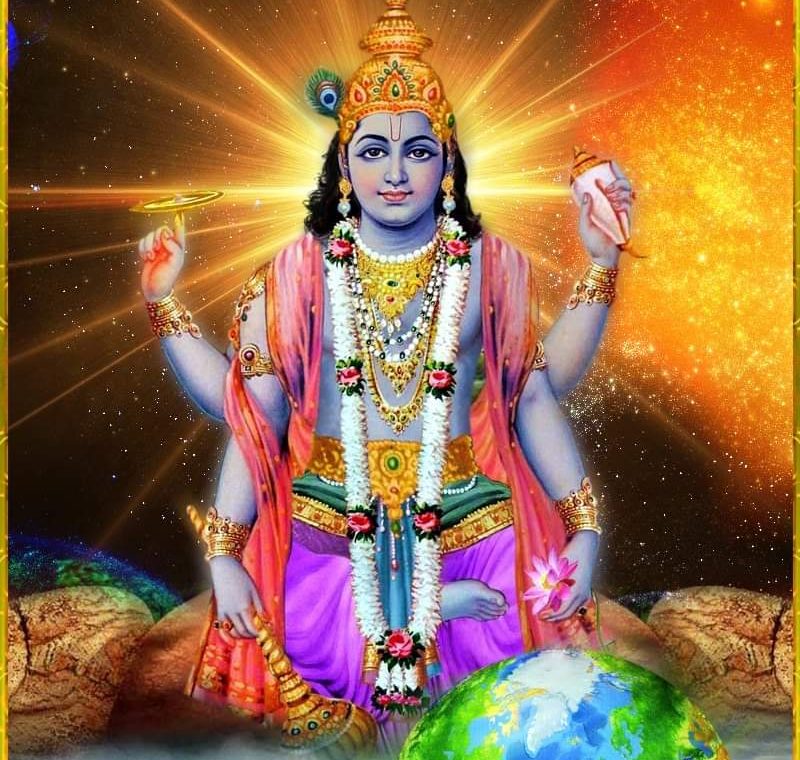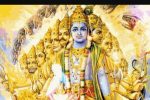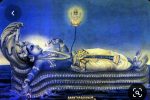NAME 47
Hṛṣīkeśaḥ हृषीकेशः
He is the Lord of senses. The subtler meaning is that one who surrenders unto Him can conquer his senses. Conquering senses is one of the important aspects of realising the Brahman. Controlling the mind leads to subjugation of senses. Though senses cannot remain unused, subjugation of senses means that one should not leave impressions of sensory inputs in the mind. Impressions of the mind are capable of entering into the subconscious mind and could manifest at the most inappropriate time. Subconscious mind and karma work in tandem to cause sufferings and pains.
The Master of the Senses
This Nama can be interpreted in 2 ways.
a) Hrisheeka means sense organs and Eesha means Lord. The controller of the sense-organs of all including Brahma, Rudra etc
b) Hrisheekeshah can be split as Hrishee + Keshah. In this interpretation Hrishee means something that gives happiness and Kesha means rays. In other words Bhagavan is radiating rays of happiness in the form of Sun and the Moon. One who, in the form of the Sun and the Moon, makes this world happy through His rays.
The two interpretations are derived by looking at this word as Hrshika + Isa or Hrishi + Kesa. The first explanation is derived from “HrshikanamIsahHrshikesah” – the Lord of the sense-organs. The five gnanedriyas (Eyes – Seeing, Ears – Hearing, Nose – Smell, Mouth – Speech and Skin – Touch) and five Karmendriyas (Hands, Legs, Tongue, Excretion and Reproductive organs) are under the Lord’s control.
The second interpretation is given based on Kesa – rays, Hrshi – that give happiness. The Atman, the self as Consciousness is the one who gives light to all sense organs and, therefore, it is the lord of all sense organs. This lord is Vishnu. The absolute word Hrishika also means the ‘rays’ or that which gives the joy’. Thus the term Hrishika can mean “the Lord of the rays”: the sun and moon. This way interpreted, commentators point out that the term Hrishikesha means He who has Himself becomes the Sun and the Moon.
In His manifestation as the Sun and the Moon, the Lord Himself whips the world to wakeful activities and sends the world to sleep and rest. Thus Hrishikesha in its deeper significance, is, to all contemplative hearts, the Lord, who becomes Himself the world, exhausts Himself in His activities, and ultimately packs His toys and goes to rest at the time of dissolution.
४७. ॐ हृषीकेशाय नमः।
47. Om Hrisheekesahay Namah
Hrisheekesah –In the Puranic literature the meaning of the term is ‘close-cropped’ or ‘One who has coiled up his locks of hair’ (Hrissheeka+Eesa).
The term ‘Hrisheeka’ is an absolute one now, and it means the “sense organs”. The Lord of Senses.
The Aatman, the self as Consciousness is the one who gives light to all sense organs and, therefore, it is the lord of all sense organs or the Power by which the sense organs function in the way they do.
The obsolete word Hrisheeka also means the ‘rays’ or that which gives the joy’. Thus the term Hrisheekas can mean “the Lord of the rays”: the sun and moon. This way interpreted, commentators point out that the term Hrisheekesah means He who has Himself becomes the Sun and the Moon.
In His manifestation as the Sun and the Moon, the Lord Himself whips the world to wakeful activities and sends the world to sleep and rest. Thus Hrisheekesa in its deeper significance, is, to all contemplative hearts, the Lord, who becomes Himself the world, exhausts Himself in His activities, and ultimately packs His toys and goes to rest at the time of dissolution.
INTERPRTRATION GUIDED BY SANT VANI (WORDS OF SAINTS)
Hṛṣīkeśaḥ
The Lord of the senses.
The svarūpa of Bhagavān is presented here as the pratyagātmā, the inner self. Hṛṣīka means the sense organs. As the self, the kṣetrajña, He is Īśa, the Lord of the senses. It is because of His blessings that each sense organ is able to function in a specific way and so too the mind.
If one has a problem with the vision of the eye, then, generally one goes to an ophthalmologist. How can we trust this specialist if he has not seen the eyes of atleast 1 billion people in the world? He need not see the eyes of 1 billion people because the principles governing eyesight, the norms for conditions of the retina, cornea, range of vision are principles he has studied in ophthalmology.
Opthalmology is a science and a peek into the laws of Isvara governing the visual order of sight. That the eyes – just a few cms wide and a few cms in length can see huge panoramas, can see colors that other animals cannot see, are protected by continuous natural moisturisation and blinking are just wonders. And we are only talking about the eyes here!
The taste buds of the tongue, designated for different tastes, have a distinct place on the small section of the tongue. So when we taste something and say the salt is not enough or it is too much, we are able to say it because of our taste buds, which don’t create confusion. While talking, the tongue does its job. Each of these sense organs functions in a particular way because of the Lord in the form of the order.
All the sense organs and the laws that govern them are all under His vaśa, control. Therefore, as the ātmā of everyone, He is called Hṛṣīkeśa.
The master of the “senses” – That īśa (supreme master) of all the hṛṣīkas (senses). Also, he who turns the ‘senses’ of his devotees inwards (towards himself, i.e. the indwelling atman); while also turning away those who are not devoted to him. OR “He is the Keśas (meaning the rays in the sun and the moon) and responsible for waking up the world and all its beings everyday at dawn (as Agni/Tejas in the Sun) and putting everyone to sleep at night (as Somas’ in the moon) – again a reference to the ‘organizing’ function of Viṣhṇu.
Or keśa means rays. The cool rays of the moon make you sleep and those of the sun wake you up and engage you in various activities. It is Bhagavān, who in the form of the keśa, rays of the sun and the moon, makes everyone hṛṣṭa, happy. Therefore, He is called Hṛṣīkeśa.
It should be noted though that the first interpretation of this name as “The supreme master of the senses” is the more in vogue and the better accepted one than the second one which is more or less obsolete now.
The previous name in this string APRAMEYĀḤ talked about how the Supreme being is unbounded, immeasurable, infinite, unlimited, unfathomable, incomparable, inscrutable – who cannot be ‘proved’ or “demonstrated” through the normal means of measurements (know to the human mind) – for a moment it appears as if it is almost impossible to “realize” this Supreme being” but the very next name in the string, gives us the assurance that while he may be beyond the grasp of the ‘normal’ senses’ it is indeed possible to realize him by transcending the senses and to do that one has to turn inward and he will provide the required guidance – HṚṢĪKĒŚA – that master of all the senses, the holder of the reins of the body-chariot, controller of the horse-senses – the great Kṣetrajña (the knower of the ‘field’) in that kṣétra (Kurukṣétra – the field of transformation).
In the Bhagavad-gītā Arjuna uses about 42 different names to refer to Kṛṣṇa and each of the names are contextual and there is a definite and gradual progression, starting with ‘Acyutā’ – when Arjuna asks Kṛṣṇa to drive the chariot to the center of the battlefield…
It is not until the 36th verse of the 11th chapter that Arjuna calls Kṛṣṇa as Hṛṣīkēśa and that is after he has been given the vision of the Viśvarūpā – the Virātarūpā of the Supreme being, when he has both “progressed enough” to be able to transcend the limitations of the ‘senses’ and contemplate on the sheer magnificence of that Supreme being.
As a side-note isn’t it interesting that Sanjaya calls Kṛṣṇa as Hṛṣīkēśa right in the first chapter itself – was his blindness an allegorical reference to him having already turned his gaze inward and hence ‘blind’ to the outward world in a sense?
As Arjuna says:
अर्जुनउवाच |
स्थानेहृषीकेशतवप्रकीर्त्या
जगत्प्रहृष्यत्यनुरज्यतेच |
रक्षांसिभीतानिदिशोद्रवन्ति
सर्वेनमस्यन्तिचसिद्धसङ्घा: ||
BG Chapter 11.36
arjuna uvācha
sthānehṛiṣhīkeśhatavaprakīrtyā
jagatprahṛiṣhyatyanurajyate cha
rakṣhānsibhītānidiśhodravanti
sarvenamasyanti cha siddha-saṅghāḥ
You are indeed (स्थाने) the master of the senses (hṛiṣhīkeśha) who the whole world praises and over which you have complete suzerainty (jagatprahṛiṣhyatyanurajyate cha). In your presence, the Rākṣasas in fear (bhītāni) run away in all directions (diśhodravanti). All the sidda-purushas bow down to you (as the supreme being).
Please listen from 16.45min to 19.53min
Beautiful Prayer Meditation to the Lord Hṛṣīkeśah from Lakshmi Tantra.



